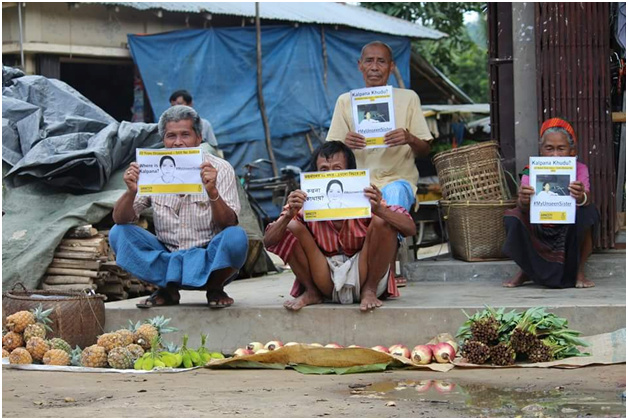20 Years After Her Disappearance, Bangladesh Govt Still Hides Truth

NEW DELHI: The night was a dark one. The air fresh and moist. Perhaps only the sound of a cicada punctuated the silence. In her small house, in rural Bangladesh, Kalpana Chakma and her family lay sleeping. Little did they know, those hours would be their last together.
At 1am on the June 12,1996, plain-clothed military and paramilitary officers broke into Kalpana’s house and dragged her away at gunpoint. On the 20th anniversary of her disappearance, she has yet to be found, and justice has yet to be served.
Kalpana’s brothers were shot at but managed to escape. They witnessed Kalpana’s abduction and identified three men involved. The military operation – for that’s what is was – was led by a Lieutenant Ferdous.
Kalpana was a prominent feminist and indigenous rights activist. She was the Organising Secretary of the Hill Women’s Federation – an organisation committed to fighting gender-based violence and patriarchy in the Chittagong Hill Tracts region of Bangladesh.
This region is home to eleven indigenous peoples whose existence the government has long been keen to deny. For decades, state-sponsored persecution has attempted to forcibly assimilate them. Kalpana was at the forefront of the indigenous peoples’ struggle for existence and rights. Today, the Chittagong Hill Tracts remain one of the most militarised regions on the planet.
Since that fateful night, 20 years ago, the entire state machinery has ensured that the truth will never be found. Kalpana’s brothers told the police about Lieutenant Ferdous, and about what they saw that night. Yet in the following police investigation their testimony was ignored.
The findings of that investigation were kept hidden for 14 long years. When the report was finally released in 2010 it simply asserted that Kalpana had been “willingly or unwillingly abducted”, as if ‘willing abduction’ were not a contradiction in terms.
This report contained “deliberately misleading contents, allegedly, to save the perpetrators from being accused,” indigenous rights organisation Kapaeeng Foundation, said in a press statement.
Since then, a court has ordered the case to be reopened. However, once again, the state obstructs justice.
"The police have been charged with producing a report and this report has not appeared," said Chris Chapman of Amnesty International.
"The courts keep setting new deadlines for the report to be produced but those deadlines pass and the report is not produced. We consider this to be a case of impunity which we are extremely concerned about"
Last month, their 30th deadline expired without anything being submitted to the court. The police claim that since Kalpana was the main witness to her abduction, nothing further can be done until she is found. Clearly, the testimonies of her family are meaningless.
“The court hearings of the case of Kalpana Chakma have been continuing for years without showing any significant progress in sight,” the Kapaeeng Foundation said.
Of course stories like Kalpana’s are all too common in South Asia. The tactics of enforced disappearance have formed a key weapon in the arsenal of most states in the region.
Enforced disappearances show a state’s weakness and vulnerability. Those the state ‘disappears’, pose a threat to authority. The threat is often the audacity to evade the logic of the nation state, to dream of alternative futures that elude the sacrosanct modernity upon which the state is precariously perched.
The state justifies atrocity and disappearance as if they are somehow expiated on the altar of ‘progress’. They must be borne with a masculine fortitude for all will be absolved when the nation is reborn as a homogenised, post-industrial, commodified utopia. It is imperialism reincarnated.
The state cannot charge people like Kalpana in a court of law, because often their only 'crime' is to think freely. Yet it is precisely because of this, that the Kalpanas of this world will forever pose the greatest threat to the state, and to authority in general.
In Kalpana's case, there has been complete impunity. Lieutenant Ferdous has since been promoted to Major, and has reportedly served abroad on peacekeeping missions.
The people of Bangladesh continue to wait, and hope that one day, Kalpana will be found. But 20 years is a long time to wait for justice.



